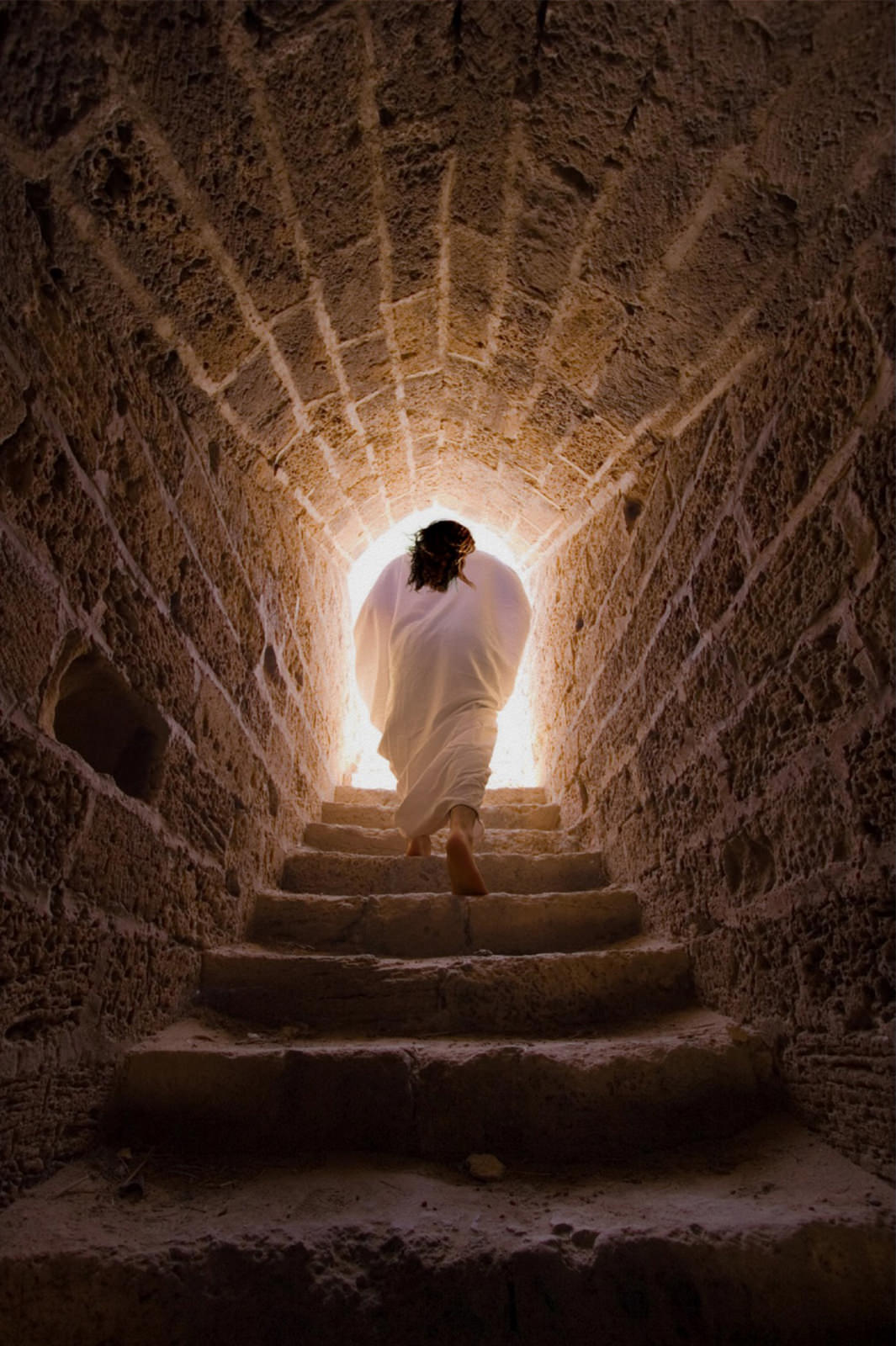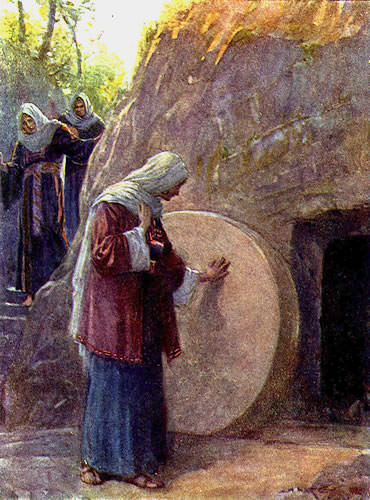Resurrection of the Dead
The Fourth Lateran Council teaches that all men whether elect or reprobate, "will rise again with their own bodies."
In the language of the creeds and professions of faith this return to life is called resurrection of the body for a
double reason:
- since the soul cannot die, it cannot be said to return to life;
- the heretical contention of Hymeneus and Philetus that the Scriptures denote by resurrection not
the return to life of the body, but the rising of the soul from the death of sin to the life of grace, must
be excluded.

Jesus Resurrection
by Keith Reicher1
Possible harmony of the Gospels
Here is an outline of a possible harmony of the Evangelists' account concerning the principal events of Easter Sunday:
- The holy women carrying the spices previously prepared start out for the sepulchre before dawn, and reach it after
sunrise; they are anxious about the heavy stone, but know nothing of the official guard of the sepulchre (Matt. 26,
1-3; Mark 16, 1-3; Luke 14, 1; Joh 20, 1).
- The angel frightened the guards by his brightness put them to flight, rolled away the stone, and seated himself
(not uponm Greek: ep autou, but) above (Greek: epano autou) the stone (Matt. 28, 2-4).
- Mary Magdalen, Mary the Mother of James, and Salome approach the sepulchre, and see the stone rolled back, whereupon
Mary Magdalen immediately returns to inform the Apostles (Mark 16, 4; Luke 24, 2; John 20, 1-2).
- The other two holy women enter the sepulchre, find an angel seated in the vestibule, who shows them the empty
sepulchre, announces the Resurrection, and commissions them to tell the disciples and Peter that they shall see Jesus in
Galilee (Matt. 28, 5-7; Mark 16, 5-7).
- A second group of holy women, consisting of Joanna and her companions, arrive at the sepulchre, where they have
probably agreed to meet the first group, enter the empty interior, and are admonished by two angels that Jesus has
risen according to His prediction (Luke 24, 10).
- Not long after, Peter and John, who were notified by Mary Magdalen, arrive at the sepulchre and find the linen
cloth in such a position as to exclude the supposition that the body was stolen; for they lay simply flat on the ground,
showing that the sacred body had vanished out of them without touching them. When John notices this he believes (
John 20, 3-10).
- Mary Magdalen returns to the sepulchre, sees first two angels within, and then Jesus Himself (John xx, 11-16;
Mark xvi, 9).
- The two groups of pious women, who probably met on their return to the city, are favored with the sight of
Christ arisen, who commissions them to tell His brethren that they will see Him in Galilee (Matt. 28, 8-10;
Mark 16, 8).
- The holy women relate their experiences to the Apostles, but find no belief (Mark 21, 10-11; Luke 24,
9-11).
- Jesus appears to the disciples at Emmaus, and they return to Jerusalem; the Apostles appear to waver between
doubt and belief (Mark 16, 12-13; Luke 24, 13-35).
- Christ appears to Peter, and therefore Peter and John firmly believe in the Resurrection (Luke 24, 34;
John 20, 8).
- After the return of the disciples from Emmaus, Jesus appears to all the Apostles excepting Thomas (Mark 16,
- The harmony of the other apparitions of Christ after His Resurrection. (Luke 10, 36-43; John 20, 19-25).
presents no special difficulties.

Jesus Resurrection2
Resurrection of Jesus Christ
The main sources which directly attest the fact of Christ's Resurrection are the Four Gospels and the Epistles of St.
Paul. Easter morning is so rich in incident, and so crowded with interested persons, that its complete history presents
a rather complicated tableau. It is not surprising; therefore, that the partial accounts contained in each of the Four
Gospels appear at first sight hard to harmonize. But whatever exegetic view as to the visit to the sepulchre by the
pious women and the appearance of the angels we may defend, we cannot deny the Evangelists' agreement as to the fact
that the risen Christ appeared to one or more persons. According to St. Matthew, He appeared to the holy women, and
again on a mountain in Galilee; according to St. Mark, He was seen by Mary Magdalen, by the two disciples at Emmaus, and
by the Eleven before His Ascension into heaven; according to St. Luke, He walked with the disciples to Emmaus, appeared
to Peter and to the assembled disciples in Jerusalem; according to St. John, Jesus appeared to Mary Magdalen, to the ten
Apostles on Easter Sunday, to the Eleven a week later, and to the seven disciples at the Sea of Tiberias. St. Paul
enumerates another series of apparitions of Jesus after His Resurrection; he was seen by Cephas, by the Eleven, by more
than 500 brethren, many of whom were still alive at the time of the Apostle's writing, by James, by all the Apostles,
and lastly by Paul himself.
Eye Witnesses
Briefly, therefore, the fact of Christ's Resurrection is attested by more than 500 eyewitnesses whose experience,
simplicity, and uprightness of life rendered them incapable of inventing such a fable, who lived at a time when any
attempt to deceive could have been easily discovered, who had nothing in this life to gain, but everything to lose by
their testimony, whose moral courage exhibited in their apostolic life can be explained only by their intimate
conviction of the objective truth of their message. Again the fact of Christ's Resurrection is attested by the eloquent
silence of the Synagogue which had done everything to prevent deception, which could have easily discovered deception,
if there had been any, which opposed only sleeping witnesses to the testimony of the Apostles, which did not punish the
alleged carelessness of the official guard, and which could not answer the testimony of the Apostles except by
threatening them "that they speak no more in this name to any man" (Acts, iv, 17). Finally, the thousands and millions,
both Jews and Gentiles, who believed the testimony of the Apostles in spite of all the disadvantages following from such
a belief, in short the origin of the Church, requires for its explanation the reality of Christ's Resurrection, for the
rise of the Church without the Resurrection would be a greater miracle than the Resurrection itself.
Character of Christ's Resurrection
The Resurrection of Christ has much in common with the general resurrection; even the transformation of His body and of
His bodily life is of the same kind as that which awaits the blessed in their resurrection. But the following
peculiarities must be noted: (I) Christ's Resurrection is necessarily a glorious one; it implies not merely the reunion
of body and soul, but also the glorification of the body. (2) Christ's body was to know no corruption, but rose again
soon after death, when sufficient time had elapsed to leave no doubt as to the reality of His death. (3) Christ was the
first to rise unto life immortal; those raised before Him died again (Col., i, 18; I Cor., xv, 20). (4) As the Divine
power which raised Christ from the grave was His own power, He rose from the dead by His own power (John, ii, 19; x, 17-18).
(5) Since the Resurrection had been promised as the main proof of Christ's Divine mission, it has a greater dogmatic
importance than any other fact. "If Christ be not risen again, then is our preaching vain, and your faith is also vain"
(I Cor., xv, 14).
Importance of Christ's Resurrection
Besides being the fundamental argument for our Christian belief, the Resurrection is important for the following reasons:
(1) It shows the justice of God who exalted Christ to a life of glory, as Christ had humbled Himself unto death (Phil.,
ii, 8-9). (2) The Resurrection completed the mystery of our salvation and redemption; by His death Christ freed us from
sin, and by His Resurrection He restored to us the most important privileges lost by sin (Rom., iv, 25). (3) By His
Resurrection we acknowledge Christ as the immortal God, the efficient and exemplary cause of our own resurrection (I Cor.,
xv, 21; Phil., iii, 20-21), and as the model and the support of our new life of grace
(Rom., vi, 4-6; 9-11).

